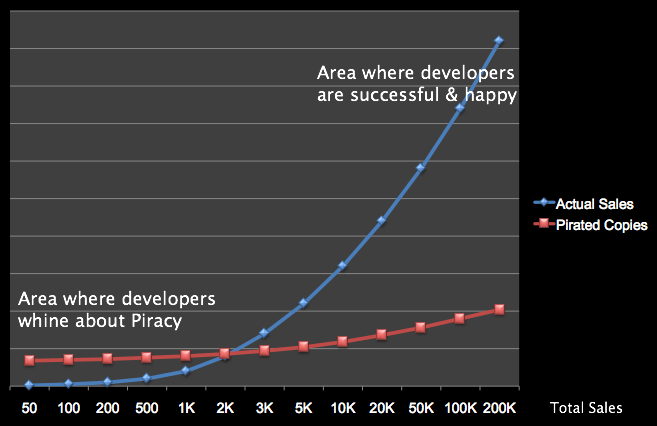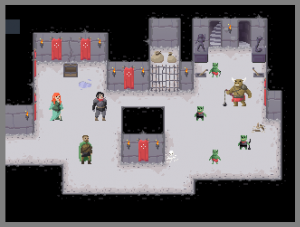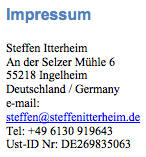It isn’t piracy! … Not even close.
I have a problem with terms that are not clearly defined. Words like “much”, “a lot” or as in this case: “unbelievably high”. If you argue that the problem with Android is its high piracy rate based on one developer’s subjective statement and general hearsay, it’s not an argument.
Before I get to debunk why piracy can’t be that big an issue for Android developers, allow me to restate which developers regularly complain about piracy to begin with. There always seems to be the issue that low selling apps see a much larger percentage of pirated copies being used than high volume apps. This is because some pirates download and try out almost everything that’s available just because they can.
Interestingly, the badly selling app developers seem to be those who complain the most about piracy. Because it’s so easy to blame a failure to sell on piracy. See this fictive graph:
Discuss this topic on Cocos2D Central.
My Learn iPhone and iPad Cocos2D Game Development book is out and that inevitably meant it would appear on websites offering download links to illegal copies of the book.
Since there’s really nothing that can be done about it that actually works, and because I understand (but not necessarily condone) the reasons for downloading ebooks illegally, I wanted to take a different stance. And so I’m posting my thoughts on the matter on forums and websites, where a link to an illegal download of my ebook is shared.
That way, I hope to convert a minority of the downloaders to buying customers. But my actual goal is to use their websites as marketing instruments. Shamelessly placing my links on their websites and asking their users to come here is just fair and square. If they enable illegal downloads the very least they can do for me is to allow me to enable users to more easily come here, or on rare occassions to actually buy the book. Who said that illegal downloads can’t also be a mutual relationship?
Here’s what I’ve been posting to “warez” and “free ebooks” websites offering downloads or download links of my book:
My Response on Illegal Download Sites
I’m Steffen Itterheim, author of the Learn iPhone and iPad Cocos2D Game Development book.
I see that my book is offered here for download illegally, either directly or via linking to an externally hosted file. I wanted to share my thoughts on this matter.
1) I’m not offended, disappointed or furious.
Why should I be? It’s to be expected. I’ve been working long enough in the software industry to have come to accept piracy as something that shouldn’t affect you at all.2) I don’t judge you.
A lot of people download(ed) things from the Internet that they shouldn’t have. For some, it’s part of their culture. For others, it’s the only way to take part in a world that they couldn’t otherwise afford to join. For a few, it’s simply a hobby, or a habit. Some claim it’s for research and trying things out before buying, but quite honestly I think they fall in one of the aforementioned categories. Or they’re merely being pragmatic about their spendings, cutting corners where they can.3) I won’t lecture you either.
Piracy is a fact. It’s not even a market because if piracy wouldn’t exist, most pirated products wouldn’t be selling noticeably better anyway. Only very few pirates would ever buy a product they downloaded.Those are my convictions on piracy. I think it’s pointless to complain about piracy, and it would be especially stupid of me if I did so in the lion’s den, so to speak.
I’m a realist. I understand that some percentage of you will download the book just to have it. You’re the collectors, you may skim over the book before you set it aside in your amazingly well-assorted, categorized archive of eBooks. Enjoy it. Then there’s a percentage of you who download the book on a hunch that you might need it soon, or that it might spark your interest (again) in game development or programming for iOS devices. You probably wouldn’t buy it either. Except for a select few for whom the book did spark a flame - but how could you know beforehand?
To everyone else who truly want to read the book, I can only encourage you to buy the book in hindsight, after the fact. I know it costs quite an effort to pay for something you have already used, or read in this case. I still hope some of you will, I’d be grateful for that.
And what I’d really like you to do, regardless of where you got the book from and what your intentions are, is to stop by and visit my website Learn & Master Cocos2D Game Development:
I also want to make it very convenient to those who *might* consider buying the book, to actually do so. I know that one aspect of piracy that shouldn’t be neglected is merely convenience. So for that reason I’ll give you the links that lead you to Amazon and other websites all around the world which carry the book, as well as links to eBook versions of the book The Learn iPhone and iPad Cocos2D Game Development:
Purchase the print book via Amazon:
Amazon.com (United States)
http://www.amazon.com/Learn-iPhone-iPad-Cocos2D-Development/dp/1430233036/ref=sr_1_1?ie=UTF8&s=books&qid=1284664414&sr=8-1Amazon.ca (Canada)
http://www.amazon.ca/Learn-iPhone-iPad-Cocos2D-Development/dp/1430233036/ref=sr_1_1?ie=UTF8&s=books&qid=1284664526&sr=8-1Amazon.co.uk (United Kingdom)
http://www.amazon.co.uk/Learn-iPhone-iPad-Cocos2D-Development/dp/1430233036/ref=sr_1_1?ie=UTF8&s=books&qid=1284664462&sr=8-1Amazon.de (Germany)
http://www.amazon.de/Learn-Iphone-Ipad-Cocos2d-Development/dp/1430233036/ref=sr_1_1?ie=UTF8&s=books-intl-de&qid=1284664401&sr=8-1Amazon.fr (France)
http://www.amazon.fr/Learn-Iphone-Ipad-Cocos2d-Development/dp/1430233036/ref=sr_1_1?ie=UTF8&s=english-books&qid=1284664539&sr=8-1Amazon.co.jp (Japan)
http://www.amazon.co.jp/Learn-iPhone-iPad-Cocos2D-Development/dp/1430233036/ref=sr_1_1?ie=UTF8&s=english-books&qid=1284664550&sr=8-1Purchase the eBook:
From Apress (PDF): http://apress.com/ecommerce/cart?act=add&bid=1524
NOTE: the Apress PDF eBook has no DRM, it is not copy-protected or password-protected. It’s probably the exact same file that is being shared here.From Amazon (Kindle): http://www.amazon.com/Learn-iPhone-Cocos2D-Development-ebook/dp/B004E0Z4YY
I hope you understand that if you offer my book for download illegally, it’s just fair to reply to that with promotion of my websites and making it a bit more convenient for the few people who tend to download books exactly because it’s convenient. At least this way I’m getting something positive out of it.
Thank you for your time and for allowing this message to be posted.
Steffen Itterheim
I’ve been asked to write something about Marketing & PR a lot of times and repeatedly. It seems to be a topic that’s often sought after and mostly misunderstood.
Sometimes, it’s deceivingly complex, as in “How to get my App featured by Apple on the App Store?”. Who the f*ck knows? If you do, be sure to tell everyone about it!
But when you dig deeper, you learn more about the whole “process” and things become a little clearer. I hear you can get lucky if you know the right people at Apple’s PR or App Store department. At least that’s what I was told personally by someone who does PR and knows someone at Apple personally. Ok, not an option for most of us. I also hear that Apple scans certain websites when looking for App Store features, and for games the #1 site to get reviewed by which in turn might lead to an Apple feature is touchArcade. What else, right?
But getting a review on touchArcade is a different matter altogether. From game industry experience, I can tell one thing that almost guarantees to get your game reviewed/featured: it should be looking awesome! And not just the game, you need a trailer that packs a punch or two, one that’s hilarious or one that’s simply exciting and really wets your appetite. Not easy to do, but well worth the money if you can outsource it to someone who knows how to do it well. And if your game doesn’t have the looks, or can’t have them, it must be uniquely interesting. Combine the two, and you got yourself a winner. That ought to be easy, right?
Well, yes and no. If you know what you’re doing, it can be easy. And it certainly feels easy in such a case. After all, all the work to set yourself up for success has already been done. But if you don’t happen to be working with world-class artists, programmers, designers - what do you do? You can pour everything you have in being creatively unique. To my mind, that’s one of the reasons why the Indie space has become so successful. It’s not just that being unique and innovative is what the developers want their games to be, it’s actually helping them a lot to get coverage in the first place - it’s even a necessity, and a way to success!
The excessively long Marketing Link List
But back on topic, I actually just wanted to share a link list with you. It’s called:
The Big List Of Indie Marketing And Business Tips
Here’s the index … as you can see, it contains a lot more than just links about marketing alone:
- Marketing
- Press Release Sites
- Business
- Piracy
- Interviews
- Game Revenue And Sales
- Advertising
- E-Mail Marketing
- Jobs
- Indie Funding
- Merchandise
- E-Commerce Payment Processors
And one link you should not miss: a free eBook about Videogame Marketing & PR!
If you think your game suffers tremendeously from App Store Piracy, you’re wrong. To put it bluntly: your game has simply failed on the market!
Reports that put the App Store piracy rates at “at least 60%” and developers reporting piracy rates of 80% and even up to 95% are mathematically correct but what they often forget to tell you are actual sales numbers. In the rare cases where Indie developers also mention how many sales they have made, pirates or not, these numbers are always extremely low. For a commercial developer who reports an 80% piracy rate on one of his games it’s simply an attempt to turn terrible sales into a PR story which might give their game a little bit more attention. In fact, i expect the games who report piracy rates of over 30% to have sold no more than 5,000 copies. At $.99 this creates a revenue of $3,500 - maybe a good number for a two-man team but a catastrophe for a commercial developer. This is hardly a problem caused by piracy but a simple failure of the product on the market.
What you have to understand about Software Pirates in general: they use a lot of software. In fact, this is their hobby and favorite passtime, to try out as much software as they can get their hands on. So you will always have a minimum amount of pirated copies of each piece of software, no matter how successful this software is (or not). Of course, with higher success and more sales of the software more pirates are also likely to use it because they, too, value quality software. But given the amount of jailbroken iPhone devices prepared to run pirated software there’s a hard cap of the maximum amount of piracy you will ever see on any title. Just as much as there will be a minimum number of pirates playing every game as soon as it becomes available and regardless of how successful it is on the App Store. If your sales are close or below that minimum number of pirates, you naturally get piracy rates of over 50%. These pirates don’t cut into your revenue however. Ignore them. They never would have bought your App in the first place!

David Rosen from Wolfire reports in his Another View on Piracy article that the highest number of Jailbroken iPhones worldwide is said to be 10%, and in the USA - whose users constitute about two thirds of the iPhone/iPod market - the number of jailbroken devices is just 5%. Assuming a total installed base of 75 Million iPhones (50 Mio. as of April 2010) and iPod touches (20 Mio. as of Sept. 2009) we get at most 7.5 Mio jailbroken devices worldwide, or approximately 2.5 Mio jailbroken devices in the USA. They are not all pirates, however. PinchMedia reports that 38% of jailbroken devices have run at least one pirated App. They also state this number is low. So let’s just take half and we’ll end up with 3.75 Mio. jailbroken devices worldwide which have run at least one pirated App. Still a pretty high number - but it only tells us that they have started one pirated App but not how many or how much of a pirate these users really are. If i had to guess i would say that 10% or just about 400,000 of these users are active pirates who try out a lot of Apps on an almost daily basis. These are the pirates who make the biggest impact in terms of per-App piracy numbers. They are also the users who are least likely to upgrade their pirated copy to a legal one, if they ever do it at all. And trying to fight these pirates is anything but futile - they will never be your customers!
PinchMedia also supports my theory that most Pirates try out as much Software as they can which, of course, leaves less time to use each App intensely: “Pirated applications are used less frequently, less intensely, and for a shorter overall length of time than purchased applications.”
Let’s go back to the gist of it: developers who have a problem with App Store Piracy have, in my opinion, either a problem of perception or they’re making a simple PR statement aimed at getting them more attention, hoping to achieve better sales. The developers who suffer most from App Store Piracy are those who simply are not successful. Their real problem isn’t Piracy, it’s much more likely that they failed either at Marketing, Timing, Quality or finding their Target Audience.
Let me sum this up with a simple chart which i think explains why App Store developers report amazingly high piracy rates, when in fact they are reporting the commercial failure of their App:













